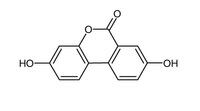Data published in Nature Medicine indicated that urolithin A, a compound generated by gut microflora from ellagitannins, may improve mitochondrial function by stimulating mitophagy, a process by which damaged mitochondria are recycled to permit a renewal with healthy mitochondria. These potent beneficial effects were observed in C. elegans, mammalian cells and rodents.
Ellagitannins are found across nature but pomegranate is one of the richest sources. The compounds are hydrolyzed in the stomach into ellagic acid, which is subsequently converted by the gut microflora into urolithin A. However, not everyone has the right microflora to be able to make the metabolite.
“We are excited to publish the first data that demonstrate the effects of this gut metabolite on mitochondrial and muscle function,” said Prof Johan Auwerx from the École Polytechnique Fédérale de Lausanne (EPFL), in Switzerland, and lead author on the paper.
“We believe this research is a milestone in current anti-aging efforts, which have previously focused on traditional pharmaceutical modalities, and illustrates the opportunity of rigorously tested nutritional bioactive agents that we consider to have outstanding potential for human health.”
Into humans
The study’s co-authors founded a start-up company, Amazentis, which has developed a method to deliver finely calibrated doses of urolithin A. Amazentis is presently evaluating urolithin A in a first human clinical trial with results expected in 2017.
“Based on the rigorous science being published in Nature Medicine, we have advanced our lead product delivering urolithin A into clinical trials,” said Chris Rinsch, PhD, a co-author and CEO and co-founder of Amazentis.
“We believe that this discovery will open the door to a new approach for managing muscle decline by rejuvenating mitochondria. Our vision is to translate breakthrough scientific discoveries in nutrition into clinically validated consumer health products that address today’s unmet needs in an aging population.”

Dr Rinsch told NutraIngredients-USA that the company intends to launch its own proprietary dietary supplement products, or to partner with the right players, but he stressed that Amazentis is not an ingredient company.
“We will launch when we’re ready and we can stand behind it,” he said.
Study details
The function of mitochondria declines with age, while aging is a known risk factor for a number of common age-related and neurodegenerative disorders. This led to the proposition that secondary mitochondrial dysfunction may lead to degenerative diseases.
The Lausanne-based scientists investigated the effects of urolithin A in C. elegans and found that it extended lifespan and prevented the age-related accumulation of dysfunctional mitochondria. Urolithin A was also associated with prolonged normal activity during aging in the nematodes.
Similar effects were observed in rodents, reported the researchers, with improved exercise capacity observed in young rats and in two different mouse models of age-related decline of muscle function.
“Mitophagy declines in cells as we age, and the reduction in mitochondrial function in the muscles of the elderly is thought to be one of the main causes of age-related muscle impairment,” stated Patrick Aebischer, co-author on the article, EPFL President and Chairman and co-founder of Amazentis. “We believe our research, uncovering the health benefits of urolithin A, holds promise in reversing muscle aging.”
To watch a video from the EPFL researchers
Source: Nature Medicine
2016, Vol. 22, Pages 879–888, doi:10.1038/nm.4132
“Urolithin A induces mitophagy and prolongs lifespan in C. elegans and increases muscle function in rodents”
Authors: D. Ryu, et al.

